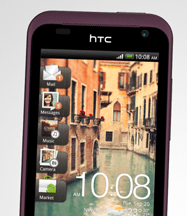With Android devices occupying nearly every niche, manufacturers are left with the odious problem of figuring how to give their products a fighting chance in a crowded market. Sometimes they lean on strange gimmicks — Samsung’s curious Galaxy Beam comes to mind here — and sometimes they just try to tackle the low-end with cheap hardware.
Though quite a few manufacturers opt for that second path, HTC is apparently having none of it. HTC CEO Peter Chou told the Wall Street Journal today that the company doesn’t want to jeopardize their brand image by catering to the low-end of the smartphone market.
“We insist on using better materials to make better products that offer premium experience,” Chou said. “Many consumers like that.”
In a way, the news mirrors HTC’s late 2011 proclamation that they would be focusing on a smaller number of “hero” devices rather than focus on pushing out slightly tweaked device after slightly tweaked device as they had done in the past.
The company’s dogged adherence to this policy means that they’ll almost certainly lose some fights to more aggressive competitors, especially in developing markets like China and India. Thanks to the proliferation of low-cost devices, both countries’ growing smartphone markets are being dominated by Android, the platform where HTC tends to spend of their time.
China in particular seems to be a place where HTC could take some hits. A recent report from Chinese research firm Analysys pegs Android as accounting for a full 76% of the Chinese smartphone market, and goes on to note that the average price of Android handsets has dipped from 2,300 yuan ($364) in Q1 2011 to 1,670 yuan ($265) in Q1 2012. Chou said that the company is not interested in selling devices for less than 1,000 yuan, a threshold he states companies like Motorola and Samsung have already sunk below.
Chou also mentioned that the company was considering acquisitions that dealt with marketing and (perhaps more importantly) software. HTC has a considerable history of inking deals with companies like Dropbox and LogMeIn to help flesh out the software side of their devices, but partnerships can only go so far (especially when the competition can cut a similar deal, as was the case with Dropbox).
Will the company’s strict adherence to this policy mean that they lose out on some short term cash? Sure, and considering that HTC is still weathering some rough seas — the company recently slashed their Q2 revenue forecast — this decision was probably mulled over very carefully. Only time will tell if their commitment to the mid-range and top-tier smartphones will see them through, but there’s something to be said for sticking to producing top-notch hardware.
